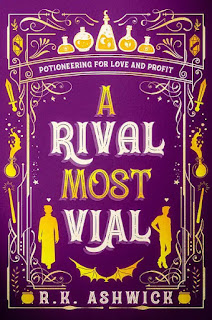The start of February 2025 finds me doing fairly with indie fantasy reading - I've now finished one semi-finalist and four finalist books in the SPFBO competition.
Mushroom Blues by Adrian M Gibson is an interesting finalist entry in the SPFBO X competition. It is told from the viewpoint of a detective, Henrietta Hoffman, employed by the Neo Kinoko Police Department in her increasingly personal mission to uncover the mystery behind the cases of some murdered children. The children are "fungals", humanoids with mushroom-like characteristics and her whole investigation is within the context of a recent bitter of war of conquest by the human Coprinians over the fungal-like Hoppinese. We get a strong picture of the devastating effects of colonisation and poverty suffered by the fungals over the course of the novel. The setting has strong cyberpunk influences and its strange developments within the city environments, based on fungal blooms, take some getting used to.
Henrietta is carrying a large amount of emotional baggage from her past as she persists with the case, also finding herself saddled unwillingly with a fungal colleague, Koji. She must overcome her own history of alcoholism and guilt, cultural brainwashing and ignorance of the fungal people she is investigating.
I found the first three-quarters of the book fairly slow, and the occasional self-flagellation by the main character off-putting. But the descriptions, characters and world-building were quality and this kept me reading. Ridgeway, Hoffman's superior, was a surprisingly well-drawn and engaging boss; while Koji's character steals the show over the most of the book, as we experience more and more revelations of his own past, hidden abilities and the dark surprises within his family. I also enjoyed the numerous common Hoppinese figures that the detectives encounter along the way, and Hoffman's startlingly psychedelic bicycle ride. The last quarter of the book is where the main action occurs and I was happily strung along for most of it.
I did find myself questioning how a character subjected to torture and the sawing through of her arm was able to carry a child shortly afterwards. And it is a very minor thing, but in a fantasy world that seems analogous to north America of the 1980s or 90s, with cars and cassette tapes, where was (the tech and cultural giant) television? But overall, this was an often dark, worthy book with a lot of lucid writing and good use of standard detective thriller story elements.
Rating: 4 stars (out of 5)
⭐⭐⭐⭐






